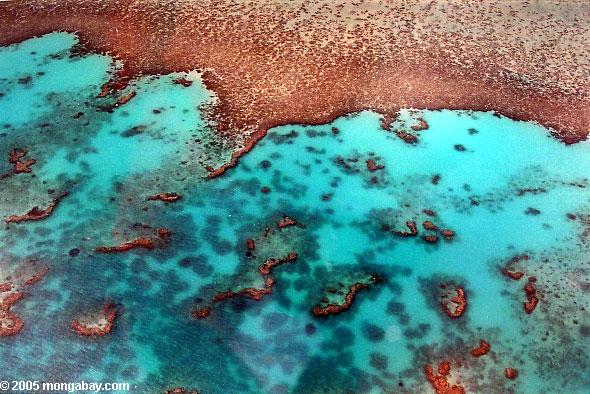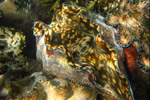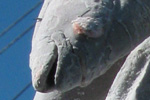
Aerial view of the Great Barrier Reef. Photo by: Rhett A. Butler.
In an announcement to coincide with the beginnings of the UN’s Rio+20 Summit on Sustainable Development, Australia has announced ambitious plans to protect 3.1 million square kilometers (1.19 million square miles) of its ocean, including the Coral Sea. If enacted, the proposition will increase Australia’s marine protected areas from 27 to 60, covering about 40 percent of Australia’s waters.
“This is the largest network of marine reserves anywhere in the world,” Environment Minister Tony Burke said. “What we’ve done is effectively create a national parks estate in the ocean. But, I think the jewel in the crown in the whole thing would have to be the Coral Sea. And, this is the area that sort of extends out from the Great Barrier Reef marine park right to the edge of Commonwealth waters.”
The new reserves will not mean full protection every where, but includes tougher regulations on fisheries as well as bans on oil and gas exploitation. The government said it is developing compensation packages for fishermen that will likely total around a $100 million, but the fisheries industry is not happy about the announcement.
“The real issue here today is that that package should have been announced with the boundaries themselves,” Brian Jeffriess, of the Commonwealth Fisheries Association, told ABC. He warned that the new restrictions could devastate fishermen and coastal communities. Others have said the restriction will raise the local price of seafood. The government has said there will be a 60-day consultation period before any parks are gazetted.
Despite fishing industry concerns, recent research shows that establishing marine protected areas could actually help fisheries by increasing overall abundance of target fish, many of which have long been overfished.
Environmental groups were generally pleased with the announcement. The head of the Australian Conservation Foundation, Don Henry, dubbed this a “historic conservation achievement that makes Australia a global leader in ocean protection,” but also warned that “although the reserve network bans oil and gas exploration in the Coral Sea, the north west region has been left vulnerable to these threats.”
The head of WWF-Australia, Dermot O’Gorman, echoed this concern, noting that “oil and gas rigs are still moving closer to places like the stunning Rowley Shoals and Ningaloo Reef off Western Australia.” The Australian Green party’s marine spokesperson, Rachel Siewert, said the parks’ borders were clearly impacted by lobbying from the gas and oil industry.
Many environmental groups had pushed for a complete ban on commercial fishing in the Coral Sea, but the current plans only stiffen regulations in the biodiverse environment, which includes the Great Barrier Reef.
Still, O’Gorman with WWF, said the government’s plan was “a major advance in marine conservation that is both nationally and globally significant,” and added that the announcement should inspire other nations at Rio+20.
But even gazetting a marine area may not be enough. A report last month by the UN warned that the Great Barrier Reef might soon be listed as ‘in danger’ on the UNESCO World Heritage list due to industrial development in the region, including a new port, a new natural gas plant, and rising coal exports through the reef. In the long term the world’s biggest reef is imperiled by climate change and ocean acidification due to burning fossil fuels, of which coal is the most carbon-intensive.
Related articles
Forgotten Species: the wonder-inducing giant clam

(06/11/2012) The first time I ever saw a giant clam was at a ride in Walt Disney World’s Magic Kingdom. My family and I piled into the Nautilus submersible at the 20,000 Leagues Under the Sea: Submarine Voyage and descended into the playtime depths. While we saw sea turtles, sharks, lobsters, mermaids, and even a sea monster, the creature that lingered in my mind most was the giant clam, raising and closing its pearly shell in the weedy abyss. Of course, none of these aquatic wonders were real—they were animatronics—but to a child with a vivid imagination they stirred within me the deep mystery of the boundless ocean, and none more so than that monstrous clam with its gaping maw.
Featured video: the oceans and Rio+20
(05/10/2012) A new video by Pew Environment Group and the Zoological Society of London (ZSL) hopes to convince policy-makers attending the Rio+20 Summit on Sustainable Development this summer that urgent action is needed to save the ocean’s from an environmental crisis.
Scientists recommend marine protected areas for Madagascar
(02/27/2012) With the government of Madagascar planning to increase marine protected areas by one million hectares, a group of researchers have laid out flexible recommendations in a new study in the open access journal PLoS ONE. The researchers employed four different analyses in order to highlight a number of different conservation options, however the different analyses pointed to the need to protect certain areas with high biodiversity, including the Barren Islands’ reefs, the reefs of Juan de Nova, the Banc de Leven, and the shallow banks of the Cap Sainte Marie.
Sowing the seeds to save the Patagonian Sea
.150.jpg)
(09/07/2011) With wild waters and shores, the Patagonia Sea is home to a great menagerie of marine animals: from penguins to elephants seals, albatrosses to squid, and sea lions to southern right whales. The sea lies at crossroads between more northern latitudes and the cold bitter water of the Southern Ocean, which surround Antarctica. However the region is also a heavy fishing ground, putting pressure on a number of species and imperiling the very ecosystem that supplies the industry. Conservation efforts, spearheaded by marine conservationist Claudio Campagna and colleagues with the Wildlife Conservation Society (WCS), are in the early stages. Campagna, who often writes about the importance of language in the fight for preservation, has pushed to rename the area to focus on its stunning wildlife.
Honduras protects sharks in all its waters
(06/26/2011) Endangered sharks are finding more sanctuaries. Honduras has announced that commercial shark fishing will be banned from its 92,665 square miles (240,000 square kilometers) of national waters. Honduras says the ban, which follows a moratorium on shark fishing, will bring in tourism revenue and preserve the marine environment.
Coral crisis: 75% of the world’s coral reefs in danger

(02/23/2011) Marine scientists have been warning for years that coral reefs, the most biodiverse ecosystems in the ocean, are facing grave peril. But a new comprehensive analysis by the World Resources Institute (WRI) along with twenty-five partners ups the ante, finding that 75% of the world’s coral reefs are threatened by local and global impacts, including climate change. An updating of a 1996 report, the new analysis found that threats had increased on 30% of the world’s reefs. Clearly conservation efforts during the past decade have failed to save reefs on a large-scale.
World has run out of fishing grounds

(12/06/2010) The world’s oceans can no longer accommodate fisheries expansion, confirms a study conducted by joint effort between the University of British Columbia and the National Geographic Society. The study is the first of its kind to analyze the geographic expansion of global fisheries. Published in the journal PLoS ONE, the study lends additional credence to reports that current fishing practices are unsustainable. Researchers holistically determined the ecological footprint of commercial fisheries by looking at primary production—the tiny organisms that make up the bottom of the food chain—and calculating the amount necessary to support current fishing yields around the world from 1950 to 2005. The study finds that the amount of primary production required to maintain commercial fishing at current levels far exceeds that which exists.